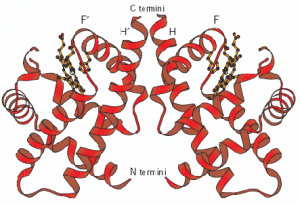Biology and environmental engineering researchers at IIT describe how Vitreoscilla hemoglobin (VHb) can enhance ethanol production in Escherichia coli in a variety of growth media by increasing the oxygen supply in a new article in Biomass and Bioenergy. The work is an important step in research in the production of ethanol from biomass.
Longtime collaborators Ben Stark, professor of biology, and Krishna Pagilla, professor of environmental engineering, and graduate students Stephanie Kunkel, Jia Wang and Marina Arnaldos teamed up on the research, published in the article “Vitreoscilla hemoglobin enhances ethanol production by Escherichia coli in a variety of growth media” in February 2012.
VHb is a novel bacterial hemoglobin used to genetically engineer improved biochemical properties of diverse bacteria for increased production of biofuels, plastics, and other uses. Stark is a leading researcher in the molecular biology, biochemistry and physiology of VHb. Pagilla is interested in physicochemical and biological methods of water pollution control.
Past research showed VHb enhanced ethanol production in a limited range of nutrient concentrations. The new research shows that enthanol production enhancement achieved by VHb is highly robust with respect to the concentrations of both corn fiber hydrolysate and the adjunct nutrients in LB medium. It also confirms that the VHb effect is the result of increases in both cell mass and efficiency of ethanol production.

